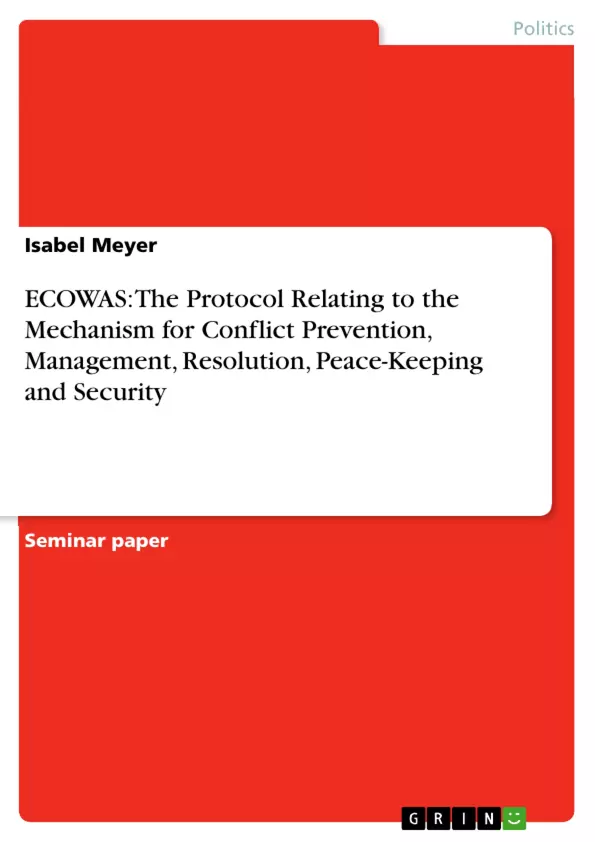On 10 December 1999 the Economic Community of West African States (ECOWAS) adopted the Protocol Relating to the Mechanism for Conflict Prevention, Management, Resolution, Peace-Keeping and Security and hence passed “probably (...) the most ambitious instrument on the regulation of collective security ever attempted to date” (Abass 2000: 212).
After three military interventions in the 1990ies ECOWAS, a purely economically intended community at the beginning, was in need of better legal foundations for its missions. The interventions in Liberia, Sierra Leone and Guinea-Bissau were largely characterized by political disputes mostly between anglophone and francophone members of ECOWAS, by weak legal foundations and massive shortcomings in financing, training and equipping the military missions. None of the three interventions can be seen as a pure success. There is even a controversy debate whether the ECOWAS interventions might have prolonged instead of shortened the civil wars in Liberia, Sierra Leone and Guinea-Bissau (see Howe 1996).
The Protocol Relating to the Mechanism for Conflict Prevention, Management, Resolution, Peace-Keeping and Security was therefore the attempt to put future ECOWAS interventions on better ground. The outcome was promising, but still bears many deficiancies. Some relate to the provisions made in the Protocol, some relate to the nature of ECOWAS.
The sucess or failure of ECOWAS´ military engagement in securing peace in the region is vital for the all-african efforts to build up regional peace-keeping powers within the framework of the African Union and furthermore for the decentralization of the peace-keeping efforts of the United Nations. If ECOWAS found a way to manage matters of peace and security at its own this could be a encouraging example for other regions in the world. Reality however shows a different picture.
The present paper wants to examine how succesful exactly ECOWAS was in creating the Protocol Relating to the Mechanism for Conflict Prevention, Management, Resolution, Peace-Keeping and Security (in the following short “the Mechanism”) and to what extent the Mechanism can be a solution to the failures made at prior military interventions. For this purpose in the following the ECOWAS intervention in the Liberian civil war in 1990 will be examined against the background of earlier ECOWAS protocols and the against the Mechanism.
Inhaltsverzeichnis (Table of Contents)
- Introduction
- The Economic Community of West African States
- The Beginnings from 1975 to 1989
- Excursion: The civil war in Liberia
- The ECOWAS intervention in Liberia at first sight
- Assessing ECOWAS legal foundations to the ECOMOG mission
- The ECOWAS Protocol relating to the Mechanism for Conflict Prevention, Management, Resolution, Peace-keeping and Security
- Evaluation of the Mechanism and Conclusion
- Abbreviations
- Literature
Zielsetzung und Themenschwerpunkte (Objectives and Key Themes)
This paper aims to analyze the effectiveness of ECOWAS in creating the Protocol Relating to the Mechanism for Conflict Prevention, Management, Resolution, Peace-Keeping and Security, and to what extent this mechanism can address past failures in military interventions. It will examine the ECOWAS intervention in the Liberian civil war in 1990, considering earlier ECOWAS protocols and the Mechanism.
- The effectiveness of the ECOWAS Protocol on Conflict Prevention, Management, Resolution, Peace-Keeping and Security
- The role of ECOWAS in regional security
- The challenges and opportunities of regional peace-keeping initiatives in Africa
- The impact of the Liberian civil war on the ECOWAS region
- The historical evolution of ECOWAS' role in peace and security
Zusammenfassung der Kapitel (Chapter Summaries)
The introduction provides a brief overview of the ECOWAS Protocol Relating to the Mechanism for Conflict Prevention, Management, Resolution, Peace-Keeping and Security, highlighting its significance and the context of its creation. It discusses the challenges faced by ECOWAS in previous interventions, such as those in Liberia, Sierra Leone, and Guinea-Bissau, setting the stage for the analysis to come.
The chapter on the Economic Community of West African States traces the organization's origins and its early focus on economic development. It examines the development of ECOWAS' role in peace and security, highlighting key protocols such as the Protocol on Non-Aggression and the Protocol relating to Mutual Assistance of Defence. The chapter also provides a detailed account of the Liberian civil war, explaining its origins and the factors that led ECOWAS to intervene.
The chapter on the ECOWAS intervention in Liberia at first sight explores the motives behind ECOWAS' decision to intervene in the Liberian civil war. It discusses the international context at the time, emphasizing the lack of attention paid to the crisis by the United States and the United Nations. The chapter also highlights the political will within ECOWAS to demonstrate its capacity to respond to regional challenges and establish its own peacekeeping force.
The chapter on assessing ECOWAS legal foundations to the ECOMOG mission examines the legal framework surrounding ECOWAS' interventions, particularly the legal basis for the ECOMOG mission. It discusses the challenges and limitations of ECOWAS' legal foundations in the context of the Liberian intervention. The chapter also explores the political and logistical difficulties encountered by ECOWAS in mounting a successful peacekeeping operation.
The chapter on the ECOWAS Protocol relating to the Mechanism for Conflict Prevention, Management, Resolution, Peace-Keeping and Security analyzes the provisions of the Protocol in detail, examining its objectives, principles, and mechanisms for conflict prevention, management, and resolution. It discusses the hopes and expectations surrounding the Protocol, as well as its potential to improve upon previous ECOWAS interventions.
Schlüsselwörter (Keywords)
This paper explores key terms and concepts related to the ECOWAS Protocol Relating to the Mechanism for Conflict Prevention, Management, Resolution, Peace-Keeping and Security, including regional security, peace-keeping, conflict prevention, conflict management, conflict resolution, and the role of ECOWAS in promoting peace and stability in West Africa.
- Quote paper
- Isabel Meyer (Author), 2009, ECOWAS: The Protocol Relating to the Mechanism for Conflict Prevention, Management, Resolution, Peace-Keeping and Security, Munich, GRIN Verlag, https://www.grin.com/document/157548



